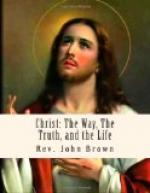Which truth, as upon the one hand, it should encourage all to choose him for their leader, and give up themselves unto him, who is so tender of his followers; so, upon the other hand, it should rebuke such as are ready to entertain evil and hard thoughts of him, as if he were an hard master, and ill to be followed, and put all from entertaining the least thought of his untenderness and want of compassion. But, moreover,
II. We see, that weaknesses and corruptions breaking out in believers, when they are honestly and ingenuously laid open before the Lord, will not fear him away, but rather engage him the more to help and succour. Much of Thomas his weakness and corruption appeared in what he said; yet the same being honestly and ingenuously laid open to Christ, not out of a spirit of contradiction, but out of a desire to learn, Christ is so far from thrusting him away, that he rather condescendeth the more, out of love and tenderness, to instruct him better, and clear the way more fully. And that, because, 1. He knoweth our mould and fashion, how feckless and frail we are, and that if he should deal with us according to our folly, we should quickly be destroyed. 2. He is not as a man, hasty, rash, proud; but gentle, loving, tender, and full of compassion. 3. It is his office and proper work to be an instructor to the ignorant, and a helper of our infirmities and weaknesses, a physician to bind up and cure our sores and wounds.
Who would not then willingly give up themselves to such a teacher that will not thrust them to the door, nor give them up to themselves always, when their corruptions would provoke him thereunto? And what a madness is this in many, to stand a-back from Christ, because of their infirmities; and to scar at him, because of their weakness, when the more corruption we find the more we should run to him? and it is soon enough to depart from Christ when he thrusts us away, and saith, he will have no more to do with us; yea, he will allow us to stay after we are thrice thrust away. Only, let us take heed that we approve not ourselves in our evils, that we hide them not as unwilling to part with them, that we obstinately maintain them not, nor ourselves in them; but that we lie open before him, and deal with him, with honesty, ingenuousness, and plainness.
III. We see, further, That ignorance ingenuously acknowledged and laid open before Christ, puts the soul in a fair way to get more instruction. Thomas having candidly, according as he thought, in the simplicity of his heart, professed his ignorance, is in a fair way now to get instruction. For this is Christ’s work, to instruct the ignorant, to open the eyes of the blind.
Why then are we so foolish as to conceal our ignorance from him, and to hide our case and condition from him; and why doth not this commend Christ’s school to us so much the more? why do we not carry as ingenious scholars, really desirous to learn? But,




